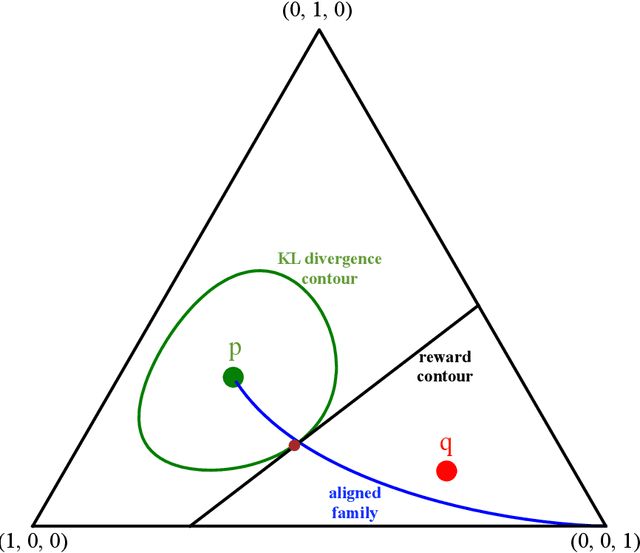Joy Qiping Yang
Asymptotics of Language Model Alignment
Apr 02, 2024
Abstract:Let $p$ denote a generative language model. Let $r$ denote a reward model that returns a scalar that captures the degree at which a draw from $p$ is preferred. The goal of language model alignment is to alter $p$ to a new distribution $\phi$ that results in a higher expected reward while keeping $\phi$ close to $p.$ A popular alignment method is the KL-constrained reinforcement learning (RL), which chooses a distribution $\phi_\Delta$ that maximizes $E_{\phi_{\Delta}} r(y)$ subject to a relative entropy constraint $KL(\phi_\Delta || p) \leq \Delta.$ Another simple alignment method is best-of-$N$, where $N$ samples are drawn from $p$ and one with highest reward is selected. In this paper, we offer a closed-form characterization of the optimal KL-constrained RL solution. We demonstrate that any alignment method that achieves a comparable trade-off between KL divergence and reward must approximate the optimal KL-constrained RL solution in terms of relative entropy. To further analyze the properties of alignment methods, we introduce two simplifying assumptions: we let the language model be memoryless, and the reward model be linear. Although these assumptions may not reflect complex real-world scenarios, they enable a precise characterization of the asymptotic behavior of both the best-of-$N$ alignment, and the KL-constrained RL method, in terms of information-theoretic quantities. We prove that the reward of the optimal KL-constrained RL solution satisfies a large deviation principle, and we fully characterize its rate function. We also show that the rate of growth of the scaled cumulants of the reward is characterized by a proper Renyi cross entropy. Finally, we show that best-of-$N$ is asymptotically equivalent to KL-constrained RL solution by proving that their expected rewards are asymptotically equal, and concluding that the two distributions must be close in KL divergence.
Learning bounded-degree polytrees with known skeleton
Oct 10, 2023



Abstract:We establish finite-sample guarantees for efficient proper learning of bounded-degree polytrees, a rich class of high-dimensional probability distributions and a subclass of Bayesian networks, a widely-studied type of graphical model. Recently, Bhattacharyya et al. (2021) obtained finite-sample guarantees for recovering tree-structured Bayesian networks, i.e., 1-polytrees. We extend their results by providing an efficient algorithm which learns $d$-polytrees in polynomial time and sample complexity for any bounded $d$ when the underlying undirected graph (skeleton) is known. We complement our algorithm with an information-theoretic sample complexity lower bound, showing that the dependence on the dimension and target accuracy parameters are nearly tight.
Near-Optimal Degree Testing for Bayes Nets
Apr 13, 2023Abstract:This paper considers the problem of testing the maximum in-degree of the Bayes net underlying an unknown probability distribution $P$ over $\{0,1\}^n$, given sample access to $P$. We show that the sample complexity of the problem is $\tilde{\Theta}(2^{n/2}/\varepsilon^2)$. Our algorithm relies on a testing-by-learning framework, previously used to obtain sample-optimal testers; in order to apply this framework, we develop new algorithms for ``near-proper'' learning of Bayes nets, and high-probability learning under $\chi^2$ divergence, which are of independent interest.
Independence Testing for Bounded Degree Bayesian Network
Apr 19, 2022
Abstract:We study the following independence testing problem: given access to samples from a distribution $P$ over $\{0,1\}^n$, decide whether $P$ is a product distribution or whether it is $\varepsilon$-far in total variation distance from any product distribution. For arbitrary distributions, this problem requires $\exp(n)$ samples. We show in this work that if $P$ has a sparse structure, then in fact only linearly many samples are required. Specifically, if $P$ is Markov with respect to a Bayesian network whose underlying DAG has in-degree bounded by $d$, then $\tilde{\Theta}(2^{d/2}\cdot n/\varepsilon^2)$ samples are necessary and sufficient for independence testing.
 Add to Chrome
Add to Chrome Add to Firefox
Add to Firefox Add to Edge
Add to Edge